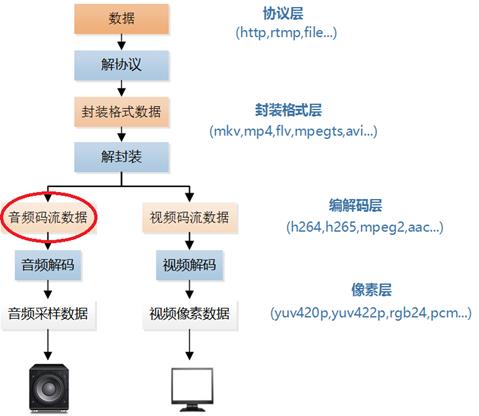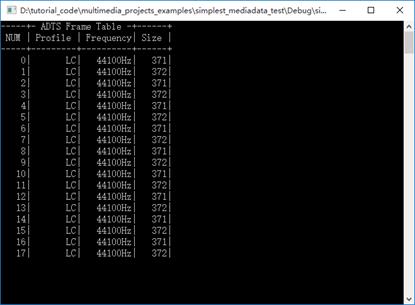视音频数据处理入门:AAC音频码流解析
Posted 雷霄骅
tags:
篇首语:本文由小常识网(cha138.com)小编为大家整理,主要介绍了视音频数据处理入门:AAC音频码流解析相关的知识,希望对你有一定的参考价值。
=====================================================
视音频数据处理入门系列文章:
=====================================================
本文继续上一篇文章的内容,介绍一个音频码流处理程序。音频码流在视频播放器中的位置如下所示。

本文中的程序是一个AAC码流解析程序。该程序可以从AAC码流中分析得到它的基本单元ADTS frame,并且可以简单解析ADTS frame首部的字段。通过修改该程序可以实现不同的AAC码流处理功能。
原理
AAC原始码流(又称为“裸流”)是由一个一个的ADTS frame组成的。他们的结构如下图所示。

代码
整个程序位于simplest_aac_parser()函数中,如下所示。/**
* 最简单的视音频数据处理示例
* Simplest MediaData Test
*
* 雷霄骅 Lei Xiaohua
* leixiaohua1020@126.com
* 中国传媒大学/数字电视技术
* Communication University of China / Digital TV Technology
* http://blog.csdn.net/leixiaohua1020
*
* 本项目包含如下几种视音频测试示例:
* (1)像素数据处理程序。包含RGB和YUV像素格式处理的函数。
* (2)音频采样数据处理程序。包含PCM音频采样格式处理的函数。
* (3)H.264码流分析程序。可以分离并解析NALU。
* (4)AAC码流分析程序。可以分离并解析ADTS帧。
* (5)FLV封装格式分析程序。可以将FLV中的MP3音频码流分离出来。
* (6)UDP-RTP协议分析程序。可以将分析UDP/RTP/MPEG-TS数据包。
*
* This project contains following samples to handling multimedia data:
* (1) Video pixel data handling program. It contains several examples to handle RGB and YUV data.
* (2) Audio sample data handling program. It contains several examples to handle PCM data.
* (3) H.264 stream analysis program. It can parse H.264 bitstream and analysis NALU of stream.
* (4) AAC stream analysis program. It can parse AAC bitstream and analysis ADTS frame of stream.
* (5) FLV format analysis program. It can analysis FLV file and extract MP3 audio stream.
* (6) UDP-RTP protocol analysis program. It can analysis UDP/RTP/MPEG-TS Packet.
*
*/
#include <stdio.h>
#include <stdlib.h>
#include <string.h>
int getADTSframe(unsigned char* buffer, int buf_size, unsigned char* data ,int* data_size){
int size = 0;
if(!buffer || !data || !data_size ){
return -1;
}
while(1){
if(buf_size < 7 ){
return -1;
}
//Sync words
if((buffer[0] == 0xff) && ((buffer[1] & 0xf0) == 0xf0) ){
size |= ((buffer[3] & 0x03) <<11); //high 2 bit
size |= buffer[4]<<3; //middle 8 bit
size |= ((buffer[5] & 0xe0)>>5); //low 3bit
break;
}
--buf_size;
++buffer;
}
if(buf_size < size){
return 1;
}
memcpy(data, buffer, size);
*data_size = size;
return 0;
}
int simplest_aac_parser(char *url)
{
int data_size = 0;
int size = 0;
int cnt=0;
int offset=0;
//FILE *myout=fopen("output_log.txt","wb+");
FILE *myout=stdout;
unsigned char *aacframe=(unsigned char *)malloc(1024*5);
unsigned char *aacbuffer=(unsigned char *)malloc(1024*1024);
FILE *ifile = fopen(url, "rb");
if(!ifile){
printf("Open file error");
return -1;
}
printf("-----+- ADTS Frame Table -+------+\\n");
printf(" NUM | Profile | Frequency| Size |\\n");
printf("-----+---------+----------+------+\\n");
while(!feof(ifile)){
data_size = fread(aacbuffer+offset, 1, 1024*1024-offset, ifile);
unsigned char* input_data = aacbuffer;
while(1)
{
int ret=getADTSframe(input_data, data_size, aacframe, &size);
if(ret==-1){
break;
}else if(ret==1){
memcpy(aacbuffer,input_data,data_size);
offset=data_size;
break;
}
char profile_str[10]={0};
char frequence_str[10]={0};
unsigned char profile=aacframe[2]&0xC0;
profile=profile>>6;
switch(profile){
case 0: sprintf(profile_str,"Main");break;
case 1: sprintf(profile_str,"LC");break;
case 2: sprintf(profile_str,"SSR");break;
default:sprintf(profile_str,"unknown");break;
}
unsigned char sampling_frequency_index=aacframe[2]&0x3C;
sampling_frequency_index=sampling_frequency_index>>2;
switch(sampling_frequency_index){
case 0: sprintf(frequence_str,"96000Hz");break;
case 1: sprintf(frequence_str,"88200Hz");break;
case 2: sprintf(frequence_str,"64000Hz");break;
case 3: sprintf(frequence_str,"48000Hz");break;
case 4: sprintf(frequence_str,"44100Hz");break;
case 5: sprintf(frequence_str,"32000Hz");break;
case 6: sprintf(frequence_str,"24000Hz");break;
case 7: sprintf(frequence_str,"22050Hz");break;
case 8: sprintf(frequence_str,"16000Hz");break;
case 9: sprintf(frequence_str,"12000Hz");break;
case 10: sprintf(frequence_str,"11025Hz");break;
case 11: sprintf(frequence_str,"8000Hz");break;
default:sprintf(frequence_str,"unknown");break;
}
fprintf(myout,"%5d| %8s| %8s| %5d|\\n",cnt,profile_str ,frequence_str,size);
data_size -= size;
input_data += size;
cnt++;
}
}
fclose(ifile);
free(aacbuffer);
free(aacframe);
return 0;
}
上文中的函数调用方法如下所示。
simplest_aac_parser("nocturne.aac");结果
本程序的输入为一个AAC原始码流(裸流)的文件路径,输出为该码流中ADTS frame的统计数据,如下图所示。
以上是关于视音频数据处理入门:AAC音频码流解析的主要内容,如果未能解决你的问题,请参考以下文章